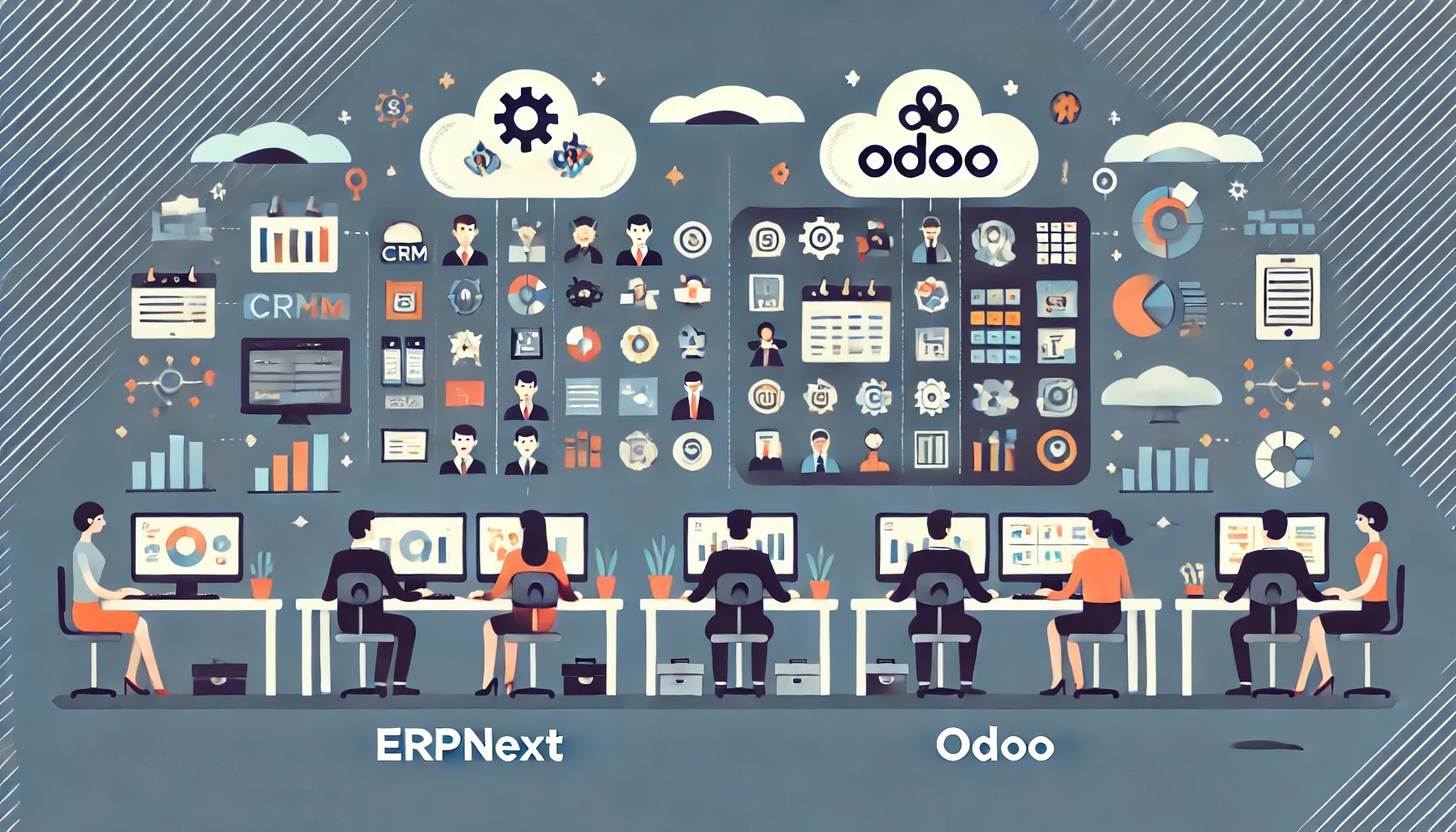ERPNext vs Odoo: Which ERP Solution is Right for Your Business?

When it comes to choosing an Enterprise Resource Planning (ERP) system, two names often emerge at the forefront: ERPNext and Odoo. Both are powerful, versatile, and widely used ERP solutions, but which one is the right fit for your business? In this comprehensive comparison, we’ll delve into the key features, pros, and cons of ERPNext vs Odoo to help you make an informed decision.
What is ERPNext?
ERPNext is an open-source ERP software that caters to small and medium-sized businesses (SMBs). Developed by Frappe Technologies, ERPNext offers a wide range of modules that cover all the essential business functions, from accounting and inventory management to HR and project management. Its simplicity and user-friendly interface make it an attractive option for companies looking for a straightforward yet comprehensive ERP solution.
What is Odoo?
Odoo, formerly known as OpenERP, is another prominent open-source ERP solution. It is known for its modular approach, allowing businesses to pick and choose from a wide array of apps and modules based on their specific needs. Odoo offers both community (open-source) and enterprise (paid) versions, catering to businesses of all sizes, from startups to large enterprises.
ERPNext vs Odoo: Key Features Comparison
1. User Interface and Ease of Use
- ERPNext: Known for its clean and intuitive interface, ERPNext is designed with simplicity in mind. It is easy to navigate, which reduces the learning curve for new users.
- Odoo: Odoo’s interface is modern and visually appealing. However, the extensive range of features and modules can make it somewhat complex, especially for new users.
2. Customization and Flexibility
- ERPNext: Offers decent customization options but might require developer assistance for more advanced customizations.
- Odoo: Highly customizable with a vast library of third-party apps and modules. Odoo’s flexibility is one of its strongest points, making it suitable for businesses with unique requirements.
3. Modules and Integrations
- ERPNext: Comes with a comprehensive suite of modules including CRM, sales, purchase, inventory, manufacturing, and more. It also supports integrations with various third-party applications.
- Odoo: Boasts a vast ecosystem of modules and third-party apps, covering nearly every business function imaginable. The extensive marketplace allows businesses to tailor the ERP system to their precise needs.
4. Pricing
- ERPNext: As an open-source solution, ERPNext is free to use. However, there are costs associated with hosting, support, and potential customizations.
- Odoo: Offers a free community version and a paid enterprise version. The enterprise version is subscription-based and can become costly depending on the number of users and modules required.
5. Support and Community
- ERPNext: Supported by a growing community of developers and users. Paid support plans are available for businesses needing professional assistance.
- Odoo: Has a large and active community, with extensive documentation and third-party resources. Odoo’s enterprise users receive dedicated support from Odoo’s team.
Pros and Cons of ERPNext
Pros
- Cost-Effective: Being open-source, ERPNext is free to use, with lower overall costs compared to many proprietary ERP solutions.
- User-Friendly: Its simplicity and straightforward interface make it easy for users to adopt.
- Comprehensive Modules: Offers a wide range of integrated modules suitable for SMBs.
Cons
- Limited Advanced Customization: While customizable, advanced changes may require developer expertise.
- Growing Community: Although growing, its community is smaller compared to Odoo’s.
Pros and Cons of Odoo
Pros
- Highly Customizable: Odoo’s modular approach allows extensive customization.
- Extensive Marketplace: A wide array of apps and modules to cater to diverse business needs.
- Scalability: Suitable for businesses of all sizes, from startups to large enterprises.
Cons
- Complexity: The extensive features can be overwhelming for new users.
- Cost: The enterprise version can be expensive, especially for larger teams.
Conclusion: ERPNext vs Odoo – Which One Should You Choose?
The choice between ERPNext vs Odoo ultimately depends on your business needs and budget.
- Choose ERPNext if: You are a small to medium-sized business looking for a cost-effective, user-friendly ERP solution with comprehensive built-in modules.
- Choose Odoo if: You need a highly customizable ERP system with a wide range of modules and apps, and you are willing to invest in a potentially higher-cost solution for extensive features and support.
Both ERPNext and Odoo are robust ERP solutions with their unique strengths. By evaluating your specific business requirements and considering the factors discussed, you can make an informed decision that aligns with your company’s goals and budget.
To compare these ERP solutions and many more, you can use our new AI-powered Compare ERP tool. It’s free to use and you get a guaranteed discount on your first year’s licence fees with a referral from Compare ERP.









